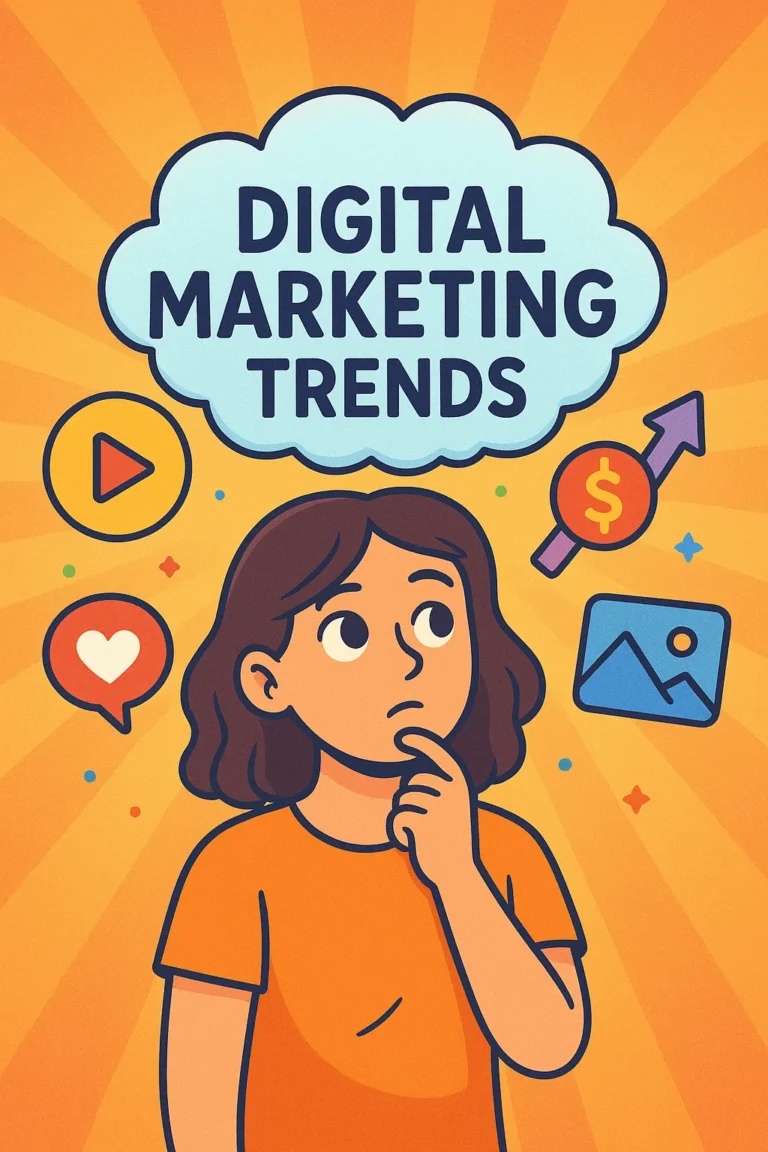- Key Digital Marketing Trends in 2025
- Artificial Intelligence (AI) & AI-driven Search:
- Short-form & Video Content:
- User-Generated Content (UGC):
- Interactive & Immersive Experiences:
- Omnichannel & Personalized Marketing:
- Ethical Marketing & Privacy-first Strategies:
- Social Commerce & Influencer Partnerships:
- Content Marketing & Thought Leadership:
- SEO Evolution:
- Marketing Automation:
- Harnessing AI in Digital Marketing
- AI in Content Creation:
- AI in Marketing Analytics:
- High-Impact Content Formats
- Key Metrics to Track
- Website Metrics:
- Conversion Metrics:
- Email Metrics:
- Ad Metrics:
- Social Media Metrics:
- Retention Metrics:
- Common Mistakes to Avoid

The digital marketing landscape is evolving faster than ever. With the rise of AI, short-form video content, personalization, and interactive experiences, businesses must adapt their strategies to meet modern consumer expectations. Understanding Top Digital Marketing Strategies & Trends and leveraging them effectively can help brands stay ahead of the competition while delivering meaningful engagement
Key Digital Marketing Trends in 2025
From AI-powered tools to social commerce and immersive experiences, 2025 brings an array of strategies that marketers need to explore:
Artificial Intelligence (AI) & AI-driven Search:
AI is transforming content creation, analytics, and marketing automation. Brands leveraging AI for predictive analytics, chatbots, and personalization can improve efficiency and ROI.
Short-form & Video Content:
Platforms like TikTok, YouTube Shorts, and Instagram Reels dominate social feeds. Video marketing, both short and long form, continues to be one of the most engaging formats.
User-Generated Content (UGC):
Consumers increasingly trust content created by other users. Incorporating UGC helps improve brand authenticity and awareness.
Interactive & Immersive Experiences:
AR/VR and gamified content drive engagement and allow brands to connect with audiences on a deeper level.
Omnichannel & Personalized Marketing:
Delivering tailored experiences across email, social media, websites, and apps strengthens customer loyalty.
Ethical Marketing & Privacy-first Strategies:
With data privacy policies tightening, first-party data collection, transparency, and ethical marketing practices are vital.
Social Commerce & Influencer Partnerships:
Direct shopping via social platforms and collaborations with influencers remain key tools for increasing conversions
Content Marketing & Thought Leadership:
Blogs, podcasts, and case studies continue to build brand authority and drive engagement.
SEO Evolution:
As search engines adopt AI, optimizing for voice search, featured snippets, and multi-format content (video, images, audio) is critical.
SEO, or Search Engine Optimization, is the practice of improving your website’s visibility on Google and other search engines. If you want to know more about SEO and how it can grow your business, click here to discover more
Marketing Automation:
Automating repetitive processes while providing personalized customer experiences enhances efficiency and engagement.
After introducing these trends, we’ll take a closer look at a few of them in more detail to understand how they can be applied effectively in your marketing strategy
Harnessing AI in Digital Marketing
AI in Content Creation:
Generative AI tools like ChatGPT or Google Gemini allow marketers to brainstorm ideas, draft content, and even produce complete campaigns. According to Adobe’s 2025 report, 42% of marketers prioritize AI for content ideation, with 64% reporting higher content output using GenAI.
AI in Marketing Analytics:
AI helps marketers uncover insights from consumer behavior, predict trends, and optimize campaigns. By leveraging predictive analytics, brands can create personalized experiences, drive conversions, and enhance ROI.
High-Impact Content Formats
Short-Form Video: Perfect for social-first audiences, these videos increase engagement and ROI.
UGC Campaigns: Encourage customers to share authentic content that builds trust.
Quality Editorial & Case Studies: Educational content and real-world examples continue to boost brand credibility.
Interactive Content: Polls, quizzes, AR experiences, and dynamic product demos enhance engagement and retention.
To ensure your digital marketing efforts are effective, it’s essential to monitor the right metrics. These key performance indicators (KPIs) help you understand audience behavior, measure campaign success, and make data-driven decisions that drive growth. Tracking these metrics consistently allows you to optimize strategies, improve ROI, and achieve your marketing goals.
Key Metrics to Track
Website Metrics:
Traffic, bounce rate, session duration, and pages per session.
Conversion Metrics:
Conversion rate (CVR), customer acquisition cost (CAC), cart abandonment.
Email Metrics:
Open rate, CTR, and engagement.
Ad Metrics:
ROAS, CPC, CPA.
Social Media Metrics:
Engagement rate, follower growth.
Retention Metrics:
Customer lifetime value (LTV), churn rate.
Common Mistakes to Avoid
- Relying solely on intuition over data.
- Chasing short-term wins without a long-term plan.
- Using generic messaging for all audiences.
- Neglecting mobile experience and website performance.
- Focusing only on new customer acquisition.
- Over-prioritizing paid ads over organic growth.
- Ignoring AI tools, automation, and emerging trends.
Digital marketing in 2025 is a dynamic blend of technology, creativity, and data-driven decision-making. From AI and marketing automation to social media, SEO, and personalized content, staying ahead requires continuous adaptation. By embracing these trends, businesses can build meaningful customer experiences, improve ROI, and maintain a competitive edge.



